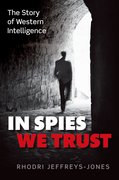The Sunday Times Oxford Literary Festival 2013 is in full swing, welcoming thinkers and writers from across the globe to our wonderful city of Oxford. We’re delighted to have over thirty Oxford University Press authors participating in the Festival this year! OUPblog will be bringing you a selection of blog posts from these authors so that even if you can’t join us in Oxford this year, you won’t miss out on all the action. Don’t forget you can also follow @oxfordlitfest and check the event schedule here.
Rhodri Jeffreys-Jones will be appearing at the Oxford Literary Festival on Thursday 21 March 2013 at 2 p.m. in a panel event with Clare Mulley, Chris Morgan Jones, and Mark Huband, to discuss ‘the spying game: reality and fiction’.
By Rhodri Jeffreys-Jones
The question is not what can membership in the European Union do for us in the UK, but what can we do for the EU? There is one way in which we British can strengthen the benefits of union. We can demand and nourish a European Intelligence Service (EIS). Forget the parochial moaning, the time is ripe for such an initiative.
In the last century it came to be accepted that effective intelligence can not only win wars and minimize civilian casualties, it can also help to prevent war — precisely the main aim of the EU, as its recent Nobel Prize confirmed. It further came to be accepted that intelligence liaison is important (two heads being better than one), and that the dominant cooperation was between the UK and USA. The Anglo-American arrangement contributed to the winning of two world wars and to the keeping of the Cold War peace.
But the ‘special intelligence relationship’ declined after the 1950s. The Cambridge Spy Ring and cover up undermined US faith in British intelligence. American administrations began to use the CIA to impose unilateral policies. Displeased with Prime Minister Edward Heath’s overtures to Europe, Henry Kissinger temporarily cut off privileged UK access to US intelligence information. Britain was broke, dependent on the Almighty Dollar, and powerless to resist these developments.
More recently, President Barack Obama performed his “pivot to the Pacific”, detaching America from it umbilical Old World ties. US interests demanded that and so does demography – Americans of European descent are about to become a minority in the USA. The idea that the relationship with Britain is special in the sense of being exclusive has for years been a cause of discreet mirth in Washington. And what’s the advantage of the US intelligence link? On present evidence, the CIA has gone into terminal decline. Demoted in the Washington hierarchy, it now specializes in drone attacks.
The EU already has some intelligence assets. The European Police Office, or Europol, is essentially an analytical intelligence agency. Thanks to French initiatives, the EU is developing a satellite intelligence capability. SITCEN is a small foreign intelligence analytical unit that reports to the External Action Service, the still-embryonic foreign affairs branch of the EU.
There are weaknesses in the current EU set-up. Member states hold the whip hand, and there is a lack of trust in the centre. Along with this goes weakness on the legislative side – we really shouldn’t trust a European intelligence service unless there is a stronger European parliament to oversee it. Neither Europol nor INTCEN have an intelligence collection facility. This means they can’t trade information with other bodies. Last and by no means least, continental Europe is, with honourable exceptions, shot through with racism. A good intelligence service must be cosmopolitan if it is to have the right expertise, and if people of all backgrounds are to trust it sufficiently to offer their cooperation.
We in Britain have something to offer. GCHQ is a major asset of a kind that the EU lacks and needs. We have experience and (setting aside the scandals that make such good stories in the press) a tradition of success in secret intelligence. We have a long way to go regarding racial tolerance, but it is a brutal truth that we can offer a better record than our continental cousins who do not even track inequalities – here, we can lead by example.
no images were found
In one crucial respect, we have already shown leadership. Since the 1990s, a remarkable number of British people have served in senior EU security and intelligence posts: Jonathan Faull as Director General of Justice and Home Affairs, Adrian Fortescue as his predecessor in the post, William Shapcott at SITCEN, Rob Wainwright as director of Europol, Aled Williams as president of Eurojust, and Catherine Ashton as High Representative for Foreign and Security Policy. We have expended our political capital getting our people into these security jobs as distinct from other posts.
To appreciate fully the positive side of a European agency, it is also wise to think negatively. Scotland may become independent. As recent parliamentary hearings confirmed, independence would necessitate a Scottish intelligence service. In the absence of an EU solution, the disaggregation of personnel with conflicting loyalties might well destroy all trust within and towards British intelligence.
Finally, the Americans. Setting aside Kissinger and other tantrums, it must be remembered that Washington has always wanted us to integrate with Europe. President Obama has recently reiterated the point. Furthermore, the Americans recognize the benefits of competitive intelligence estimates. If an alternative, trusted view of WMD had been expressed a decade ago, the world would have been saved a great deal of grief.
Rhodri Jeffreys-Jones is the author of In Spies We Trust: The Story of Western Intelligence (OUP, 2013) and of earlier histories of the CIA and FBI. Born in Wales, he is an emeritus professor of history at the University of Edinburgh.
Subscribe to the OUPblog via email or RSS.
Image credits: Europol HQ, The Hague © Europol; Henry Kissinger © NARA; Illka Salmi © SUPO; Rob Wainwright © Europol. Used with permission; all rights reserved.



Recent Comments
There are currently no comments.